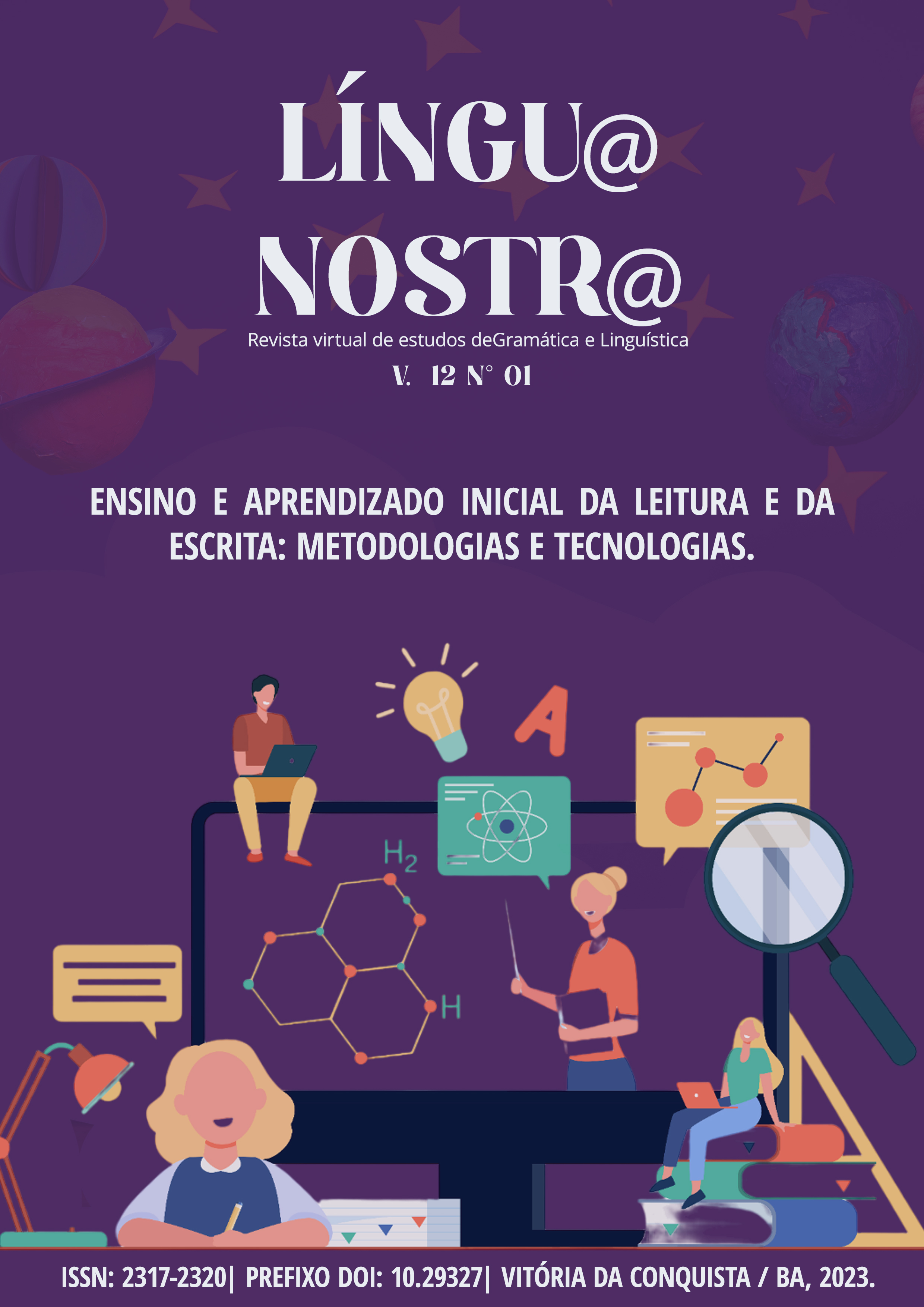WRITING IN DIGITAL GENRES: MOTIVATIONS FOR SPELLING ERRORS AND INTERNETESE IN COMMENTS ON THE SOCIAL NETWORK INSTAGRAM
DOI:
https://doi.org/10.22481/lnostra.v12i1.14680Keywords:
Speech, Writing, Digital genres, Spelling errors, InterneteseAbstract
In this work, based on a reflection made in Meireles et al. (2018), we aim to analyze cases of spelling errors and internetese in comments posted on a social network. We seek to answer two questions here: (i) Which forms found in digital genres are characterized, on the one hand, as spelling errors and, on the other, as instances of internetese language? (ii) What motivates the occurrence of these spelling errors and internetese in digital genres? As a theoretical foundation, we are based on Bortoni-Ricardo (2005, 2006), Cagliari (2005), Freitag and Fonseca e Silva (2006), Komesu and Tenani (2009), Barbosa (2016) and Simão (2022), among others studies. From a methodological point of view, our research is descriptive and qualitative in nature. As a corpus, we used 14 texts (comments) belonging to the digital sphere, taken from the social network Instagram and produced in 2023. With the analysis, we showed a distinction between spelling errors resulting from the influence of speech on writing and the arbitrariness of writing (Bortoni-Ricardo, 2005, 2006) and the linguistic forms that refer to what has been called internetese (Freitag; Fonseca e Silva, 2006; Komesu; Tenani, 2009). Our results indicate that: (i) in the digital texts examined, there is a greater variety of spelling errors motivated by the transposition from orality to writing; (ii) regarding internetese, there are more cases of abbreviation due to some functional properties of digital genres.
Downloads
References
BAGNO, Marcos. Dicionário crítico de Sociolinguística. São Paulo: Parábola, 2017.
BAGNO, Marcos. Nada na língua é por acaso: por uma pedagogia da variação linguística. São Paulo: Parábola, 2007.
BARBOSA, Juliana Bertucci. Meu aluno escreve “pexe”! Contribuições da Fonologia para entender desvios da escrita. In: ABREU, Antônio Suárez; SPERANÇA-CRISCUOLO, Ana Carolina (org.). Ensino de português e linguística: teoria e prática. São Paulo: Contexto, 2016. p. 33-48.
BORTONE, Marcia Elizabeth; ALVES, Scheyla Brito. O fenômeno da hipercorreção. In:
BORTONI-RICARDO, Stella Maris et al. (org.). Por que a escola não ensina gramática assim? São Paulo: Parábola, 2014. p. 129-159.
BORTONI-RICARDO, Stella Maris. Nós cheguemu na escola, e agora? sociolinguística e educação. São Paulo: Parábola: 2005.
BORTONI-RICARDO, Stella Maris. O estatuto do erro na língua oral e na língua escrita. In: GÖRSKY, Edair Maria; COELHO, Izete Lehmkuhl (org.). Sociolinguística e ensino: contribuições para a formação do professor de língua. Florianópolis: EDUFSC, 2006. p. 267-276.
CAGLIARI, Luiz Carlos. Análise fonológica. Campinas: Mercado de Letras, 2005.
CERVO, Amado Luiz; BERVIAN, Pedro Alcino Metodologia científica: para uso dos estudantes universitários. 3 ed. São Paulo: McGraw-Hill do Brasil, 1983.
COSTA, Sérgio Roberto. Dicionário de gêneros textuais. Belo Horizonte: Autêntica, 2008.
FÁVERO, Leonor Lopes; ANDRADE, Maria Lúcia C. V. O.; AQUINO, Zilda Z. O. Oralidade e escrita: perspectivas para o ensino de língua materna. São Paulo: Cortez, 2000.
FONSECA, Regina Célia Veiga da. Metodologia do trabalho científico. Curitiba: IESDE Brasil, 2012.
FREITAG, Raquel M. K.; FONSECA E SILVA, Marineide. Uma análise sociolinguística da linguagem utilizada na internet: implicações para o ensino de língua portuguesa. Intercâmbio. v. 15, São Paulo: LAEL/PUC-SP, 2006. Disponível em: http://revistas.pucsp.br/index.php/intercambio/article/view/3689. Acesso em: 11 out. 2023.
KOMESU, Fabiana; TENANI, Luciani. Considerações o conceito de “internetês” nos estudos da linguagem. Linguagem em (Dis)curso, Palhoça, SC, v. 9, n. 3, p. 621-643, set./dez. 2009. Disponível em: http://www.scielo.br/pdf/ld/v9n3/10.pdf Acesso em: 11 out. 2023.
LAKATOS, Eva Maria; MARCONI, Marina de Andrade. Metodologia científica. 6 ed. São Paulo: Atlas, 2011.
MARCUSCHI, Luiz A. Oralidade e escrita. Signótica, Goiânia, v. 9, n. 1, p. 119–146, 1997. Disponível em: https://revistas.ufg.br/sig/article/view/7396. Acesso em: 21 out. 2023.
MARCUSCHI, Luiz A. Gêneros textuais emergentes no contexto da tecnologia digital. In: MARCUSCHI, Luiz A.; XAVIER, Antônio Carlos (org.). Hipertexto e gêneros digitais. Rio de Janeiro: Editora Lucerna, 2004.
MARCUSCHI, Luiz A. Gêneros textuais: definição e funcionalidade. In: DIONÍSIO, Ângela Paiva; MACHADO, Anna Rachel; BEZERRA, Maria Auxiliadora (org.). Gêneros textuais e ensino. Rio de Janeiro: Lucena, 2005. p. 19-36.
MARCUSCHI, Luiz A. Produção textual, análise de gêneros e compreensão. São Paulo: Parábola, 2010.
MEIRELES, Arielle da Silva. Reflexões sobre erros ortográficos e o internetês em comentários da rede social Instagram. Orientadora: Cristina dos Santos Carvalho. 2023. 17 f. TCC (Graduação) - Curso de Licenciatura em Letras com habilitação em língua portuguesa e literaturas de língua portuguesa, Universidade do Estado da Bahia, Conceição do Coité, 2023.
MEIRELES, Arielle da Silva et al. (2018). A interferência da fala a escrita: uma análise de textos dos gêneros publicitários e virtuais. [S.L.: s.n.]
ROBERTO, Mikaela. Fonologia, fonética e ensino: guia introdutório. São Paulo: Parábola, 2016.
SEABRA, Bianca. Descubra quem criou o Instagram e como o app se tornou um sucesso. Tecmundo, 11 ago. 2023. Disponível em: https://www.tecmundo.com.br/redes-sociais/266529-descubra-criou-instagram-o-app-tornou-sucesso.htm). Acesso em: 14 dez. 2023.
SIMÃO, Julliana Raquel da Silva. Gêneros digitais nas aulas de Língua Portuguesa: um estudo sobre a BNCC. 2022. 11 f. Trabalho de Conclusão de Curso (Licenciatura em Letras) - Departamento de Letras, Universidade Federal Rural de Pernambuco, Recife, 2022. Disponível em: https://repository.ufrpe.br/handle/123456789/4193 Acesso em: 11 out 2023
SILVEIRA, Denise Tolfo; CÓRDOVA, Fernanda Peixoto. A pesquisa científica. In: GERHARDT, Tatiana Engel; SILVEIRA, Denise Tolfo. Métodos da Pesquisa. Porto Alegre: EDUFRGS, 2009. p. 31-42
Downloads
Published
How to Cite
Issue
Section
License
Copyright (c) 2024 Língu@ Nostr@

This work is licensed under a Creative Commons Attribution 4.0 International License.






